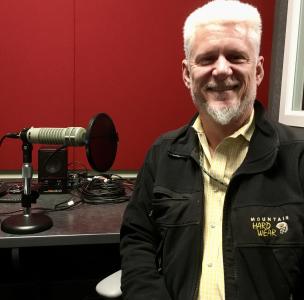Doug Whiteley

NOAA Heritage Oral History Project
NOAA Heritage Oral History Project aims to document the history and legacy of NOAA through compelling interviews with its leaders. These firsthand accounts provide an invaluable resource that preserves NOAA's significant contributions to environmental research and management, fostering a deeper understanding of NOAA's vital role in shaping our understanding of the Earth's oceans and atmosphere.
Doug Whiteley is the Division Chief of the Research to Operations and Project Planning Division (ROPPD). As Chief of ROPPD, Doug oversees pre-formulation and early formulation for new satellite systems as well as the execution of studies for project alternatives, such as foreign partnerships leveraging data and/or instrument exchanges, small-sats, payload hosting, commercial alternatives, and technology maturation to identify specific potential solutions to NESDIS top-level requirements.
Doug joined NOAA in March 1998 and has worked in multiple offices across NESDIS serving in various capacities in support of satellite operations, satellite program acquisition, and international partnerships. From 1998 to 2006, Doug worked in the Office of Satellite Operations (now Office of Satellite and Product Operations, OSPO) first as a satellite subsystem engineer for the Defense Meteorological Satellite Program (DMSP) and later as the engineering Team Lead overseeing all aspects of DMSP flight and ground operations. In 2006, he transferred to the National Polar-orbiting Operational Environmental Satellite System (NPOESS) Program Office to be the government’s Command, Control and Communications (C3S) Segment Integrated Product Team (IPT) Lead. As IPT lead he oversaw the development and delivery of command and control, terrestrial and space data networking, ground receptor placement and installation, and international collaboration. In 2010, Doug joined the Office of Systems Development (OSD, now OPPA) and has worked the formulation and execution of various flight and ground projects (COSMIC-2, Jason-3, DSCOVR) as well as with interagency and international projects (DFS, Oceansat 2, GCOM-W) in capacities ranging from Senior Engineer, Project Manager and Branch Chief, up to Deputy Director of the office.
Prior to Joining NOAA, Doug worked on NASA & NOAA flight projects such LANDSAT 4&5, the High Speed Photometer (HSP) on the Hubble Space Telescope (HST) and the Geostationary Operational Environmental Satellite (GOES) I-M program in various roles providing pre and post launch and operations engineering support.
With over 30 years of experience in the fields of spacecraft operations and acquisition, Doug is well versed in project management and systems engineering as well as office budget and resource management. He is a graduate of NOAA’s Leadership Competencies Program (LCDP), a competitive 18 month course that builds leadership acumen, as well as OPM’s Leadership for a Democratic Society. Doug holds a B.S. in Aerospace Engineering from the University of Maryland, College Park.
Scope and Content Note
Doug Whiteley discusses his career at NOAA, which spans several decades. He talks about his early interest in space and how he joined NOAA's satellite program in the late 1980s. Whiteley shares his experiences working on various satellite launches, including the DSCOVER launch, where he had the opportunity to be at the launch site and observe the launch from the rocket control center. He also mentions the COSMIC launch, which was part of a larger stack on the Falcon Heavy rocket, and his work during the GOES and DMSP launches at the control center in Suitland, MD.
The interview touches on the progression of commercialization in the space industry. Doug reflects on how, in the past, the government tried to commercialize programs like Landsat but was unsuccessful. However, in recent years, the industry itself has taken the lead in commercializing space activities, such as SpaceX's launches.
Please Note: The oral histories in this collection are protected by copyright and have been created for educational, research and personal use as described by the Fair Use Doctrine in the U.S. Copyright law. Please reach out Voices@noaa.gov to let us know how these interviews are being used in your research, project, exhibit, etc. The Voices staff can help provide other useful resources related to your inquiry.
The NOAA mission is to understand and predict changes in climate, weather, oceans, and coasts, to share that knowledge and information with others, and to conserve and manage coastal and marine ecosystems and resources. The Voices Oral History Archives offers public access to a wide range of accounts, including historical materials that are products of their particular times, and may contain offensive language or negative stereotypes.
Voices Oral History Archives does not verify the accuracy of materials submitted to us. The opinions expressed in the interviews are those of the interviewee only. The interviews here have been made available to the public only after the interviewer has confirmed that they have obtained consent.
